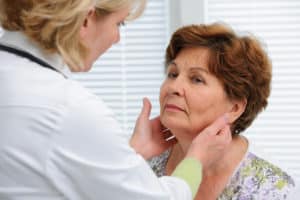Hypothyroidism is Common in Aging Adults
Millions of aging adults suffer from hypothyroidism, but many people don’t really understand the disease or how to care for an elderly relative who has it.
Seniors who have other physical issues that limit their ability to live independently rely on family caregivers and senior care providers to assist them in daily activities and help them stay safe, comfortable and healthy. When an elderly person is diagnosed with hypothyroidism, it requires some adjustments in how family caregivers and senior care providers offer care.
What is the Thyroid?
Often described as a butterfly-shaped gland, the thyroid is part of the body’s endocrine system. It is located in the neck and it is responsible for secreting hormones into the body that regulate metabolism. With thyroid disease, the thyroid can underproduce these hormones, which is known as hypothyroidism. It can also overproduce, known as hyperthyroidism. Seniors, especially women, are much more likely to develop hypothyroidism, often after they turn 60 years old.
Hypothyroidism Symptoms in Seniors
The symptoms of hypothyroidism can be difficult for family caregivers and senior care providers to identify. This is partly because the symptoms develop very slowly. It’s also difficult because the symptoms also mimic common conditions related to old age.
Common symptoms in elderly adults include weight gain, fatigue, muscle weakness, painful joints, thinning hair and lack of focus. Family caregivers and senior care providers may see these symptoms but attribute them to other illnesses or even as age-related conditions. When family caregivers and senior care providers notice hypothyroidism symptoms in elderly adults, they should schedule a doctor’s visit soon.
Treating Hypothyroidism
Because hypothyroidism causes the thyroid to slow down or stop the production of essential hormones, it’s important to get proper treatment for an elderly adult as outlined by the doctor. A blood test can determine whether or not an elderly person has hypothyroidism, and earlier detection is better for treatment options. Treatment of hypothyroidism in seniors includes medication that is a synthetic hormone to replace what the body cannot produce. It restores hormone levels and reduces or eliminates the symptoms of hypothyroidism.
While there is no cure for hypothyroidism in the elderly, proper treatment can take care of the symptoms and keep them well-managed. It’s important for family caregivers and senior care providers to schedule regular appointments with the doctor so the aging adult can be monitored for hormone levels. The doctor can adjust as necessary to ensure the elderly adult has just the right dosages.
Family Caregivers and Senior Care Providers Can Help
When elderly adults rely on family caregivers and senior care providers for assistance with daily tasks of living, they also need help in managing their hypothyroidism. From reminders on when to take medicine to adopt a healthier lifestyle such as exercise and nutritious meals, seniors with thyroid disease can adjust to the new normal and enjoy a high quality of life with well-managed symptoms.
If you or an aging loved one is considering hiring Home Health Care in Shelter Island, NY, call the caring staff at Artful Home Care today at 631-685-5001.
- The Hidden Safety Benefits of an Organized Home - April 3, 2025
- Artful Home Care Presents Planning Your Legacy: An End-of-Life Strategy Session - March 27, 2025
- Celebrate National Garden Month with Your Senior - March 19, 2025


